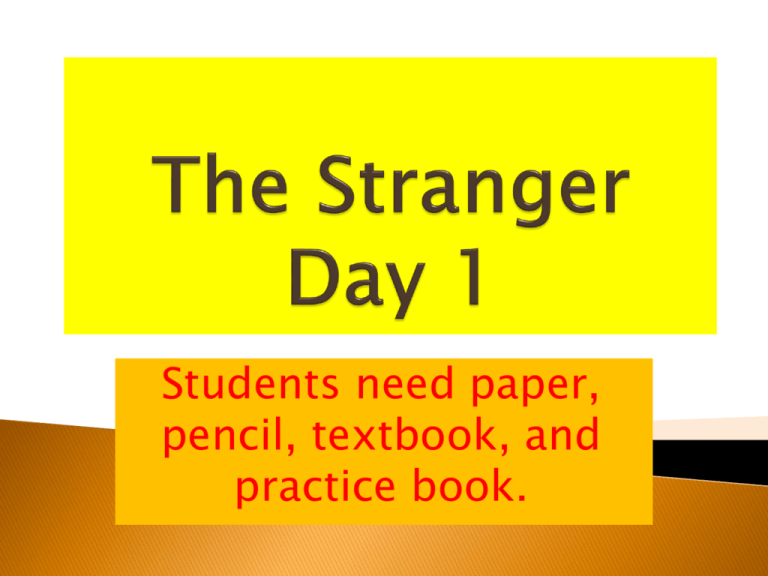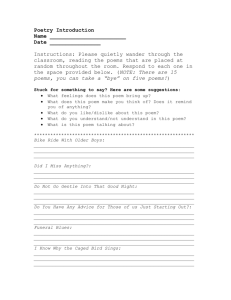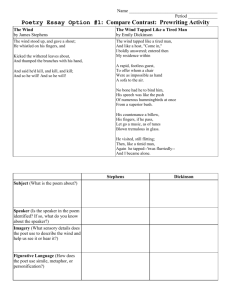The Stranger Day 1
advertisement

Students need paper, pencil, textbook, and practice book. You will listen to two poems about the fall season. Remember that poems may have rhythm and rhyme and poems create feelings and pictures in listeners’ minds. When you listen to a poem, you should listen to enjoy the rhyme and rhythm as well as the feelings the poem creates. One purpose for listening is to picture what the poet has written about through descriptive words. Stop, think, and then quickly sketch (draw) what you picture in your mind after listening to “The Tree on the Corner”. Active participation activity. What does the author, Lilian Moore mean by saying that you don’t really see a tree until you see its bones? Turn and talk to your partner about your answer. Partner 1share first. Listen to another poem about the fall season. Remember to listen to enjoy the poem, and to picture in your mind what the author is telling about. Luster is a glow of reflected light. How do you know this poem is about the fall season? What did you feel as you listened to the poems? Turn and talk to your partner. (2) What do these two poems have in common? Turn and talk to your partner. (1) Model Oral Fluency This time, echo read two lines at a time after I model them. This skill is needed to answer the openended questions on tests- to prove your answer using the information in the passage. To draw a conclusion, readers use information from the story along with what they know from real life. Drawing conclusions helps readers understand what happens in a story, and why. The paragraph says that the coin feels warm. A coin in the snow would be cold. You can conclude that the coin just fell fro someone’s warm hand. What is another clue that Enrico noticed? Who probably dropped the coin? Let’s make a graphic organizer: Story Details What You Conclusion Know There are Someone The person footprints had been who left in the the where snow. footprints Enrico is dropped standing. the coin. You can try using the READ AHEAD strategy to answer questions about a confusing word or idea in a passage. Sometimes the answers to your questions can be found later on in the text. Let’s review the READ AHEAD strategy: If you become confused by something as you are reading, you should: R52 The word “something” in the fourth sentence is confusing because the author doesn’t say what it is. Read ahead for an We need a volunteer to read answer. The next sentence has aloud the first paragraph. the answer: something refers to the strange cloud. We need a volunteer to read the second paragraph. Raise your hand when the reader comes to something that isn’t explained. We should read we ahead. need What should do to We try to understand another volunteer tothis? read P. 3. In this week’s selection, you will read about a mysterious stranger who visits a farm in the fall. Let’s make a web about what you know about this season. Stop and jot down two things you know about FALL. Did you write things like this? Some FALL facts: Turn to page 78 in your reading practice book. Work with your partner to answer 1-6. Let’s check your work: Work by yourself to answer questions 7 and 8. Let’s check your work: During “reading station” today, read this week’s selection, THE STRANGER on pages 370-383.








